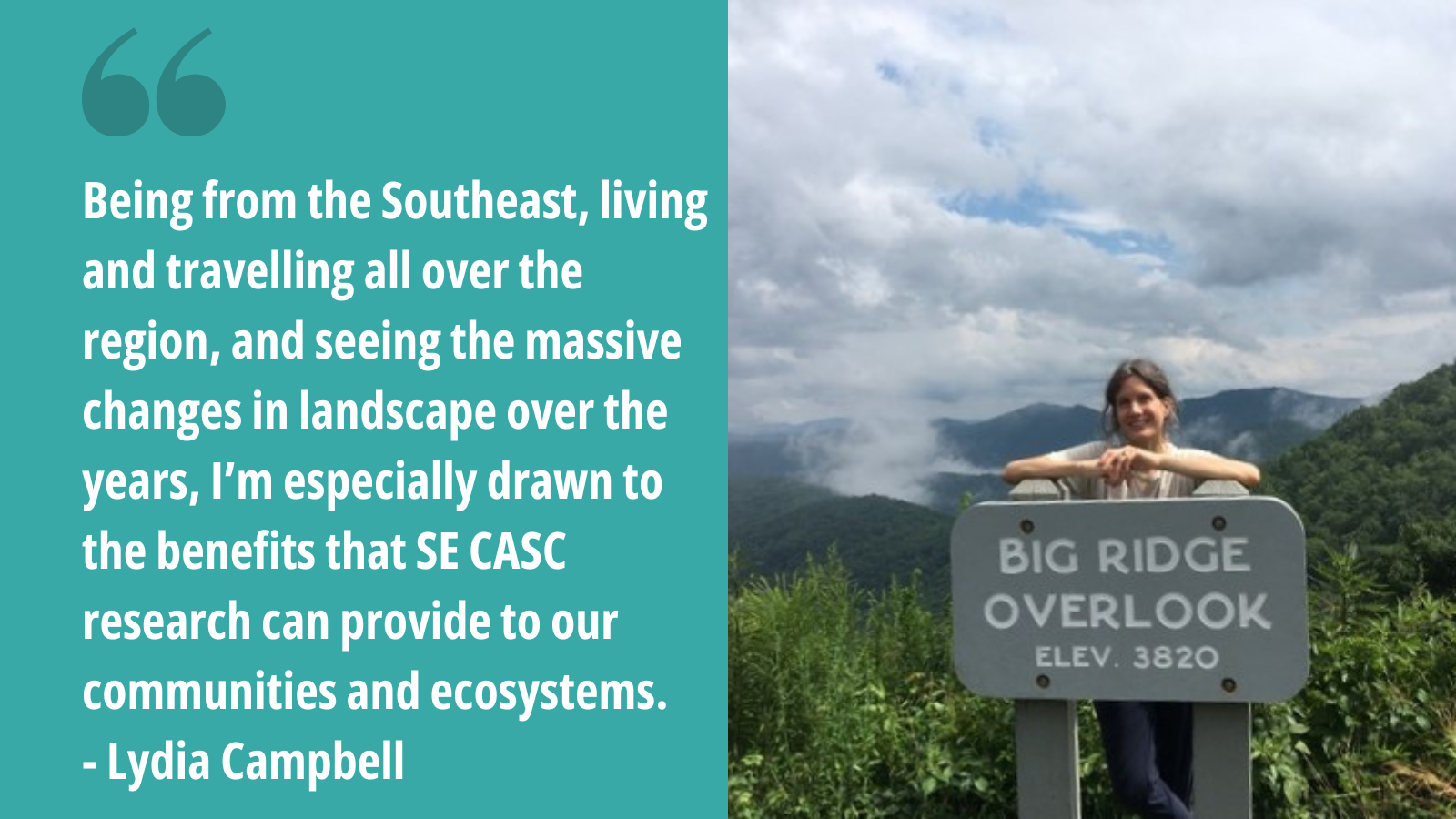Welcome Program Manager Lydia Campbell!

We are excited to welcome Lydia Campbell to the SE CASC team as our consortium program manager. Learn a bit more about Lydia in this Q&A.
What lead you to the SE CASC?
I’ve always been interested in interdisciplinary work and in my professional life, I’ve learned how building partnerships and relationships across sectors can make projects and programs richer and more impactful. I initially learned about the CASCs several years ago, when I was completing my master’s degree in Climate Change and Society at NC State. Reading through the SE CASC’s materials, I got excited about the emphasis on actionable science and co-produced research that prioritizes the needs of stakeholders and rights-holders. Being from the Southeast, living and travelling all over the region, and seeing the massive changes in landscape over the years, I’m especially drawn to the benefits that the center’s research can provide to our communities and ecosystems.
Tell us about your studies and background
I’ve had a pretty winding path! When I went to college straight out of high school, I wasn’t quite sure what I wanted to do and I ended up leaving after a couple of years because I still felt unsure about my direction. I got lucky and landed a job at a nationally recognized restaurant, which sent me on a years-long path learning about food systems and Southern foodways, building relationships with farmers, working with some of the most talented chefs in the country, and getting some valuable lessons on the importance of teamwork and hustle. In the middle of all of that, I found myself living on and helping to maintain a farm in rural Ohio and had enrolled at Ohio State to finish my undergraduate degree. I had two truly amazing professors—one in evolutionary anthropology and one in biology and ecology–that helped set me on my new academic path. I got my B.S. in Biological Anthropology with an emphasis on primate evolution and assisted with ecology fieldwork in The Bahamas. There were so many big questions that I got to ask and study: How did we get here? Why do we behave the way we do? How has environment shaped us, and how have we shaped our environment? All of those questions also tied in with my interest in food and agriculture, and so once I started the master’s program at NCSU, I decided to focus on climate change and agriculture, specifically in North Carolina and the Southeast.
What are your plans and hopes for this position?
I think my main hope is that I can provide meaningful support to the programmatic work that’s happening at the center. The position immediately appealed to me—I had just finished working as a program director on an NC Medicaid pilot focused on the social determinants of health, and I realized how much I love solving logistical and operational puzzles and creating systems to help ease the administrative burden of large grant-funded projects. From what I’ve learned here so far, SE CASC is a dynamic center with many ongoing, new, and potential projects and programs in the pipeline. I hope I can help increase the operational capacity of the center by managing the day-to-day progress of those projects, supporting continued relationship-building and coordination across the Southeast region and CASC network, and being a resource and problem-solver for our partners.
Tell us about you, the person!
I love to cook and eat, spend time and make jokes with my friends and family, go on country drives, and be outside as much as possible. I have family in Western NC and love to hike, so for many years, my husband and I have been trying to hike all of the trails in Pisgah National Forest and the Shining Rock Wilderness. We’re not close to finishing, but I bet once we do, we’ll start all over again. We just moved out to a house in the woods in Orange County, so I’m planning lots of landscaping projects and hoping to start growing shiitake mushrooms again now that we have the space to do it—watching them grow is magical and eating them is, too.
Learn more about the people who make up SE CASC here.
- Categories:
